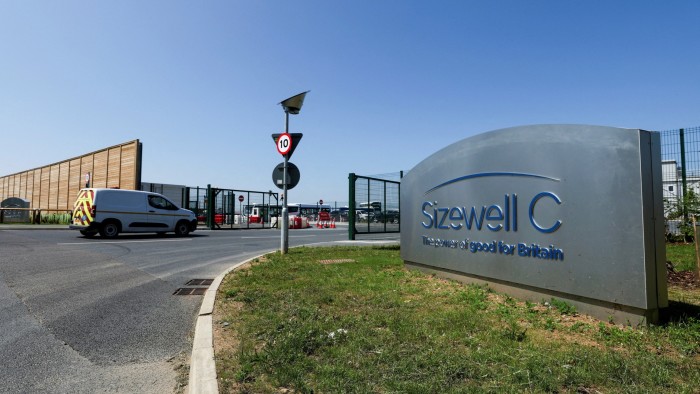Stay informed with free updates
Simply sign up to the UK energy myFT Digest — delivered directly to your inbox.
The UK government is set to raise tens of billions of pounds in debt to fund the Sizewell C nuclear power station, as it tries to revive the nuclear sector despite limited appetite from investors.
The government’s National Wealth Fund is set to provide the Suffolk project with up to £36.55bn in loans with money raised in the gilts market, according to details of the funding structure released on Tuesday.
Banks backed by France’s export credit agency will supply a further roughly £5bn in debt, while the UK government will provide £3.8bn in equity.
Households are set to pay for the project — part of a push by ministers to use nuclear power to ease Britain’s transition away from fossil fuels — throughout construction via a surcharge that the government said would amount to roughly £1 a month.
They will also support the power plant’s revenues once it is up and running.
EDF, the French state-owned utility whose reactors are being used at the plant, is providing £1.05bn in equity, while private investors La Caisse, Amber Infrastructure and Centrica have committed to a combined £3.65bn in equity.
The UK government estimates the total cost of the project will be £38bn in 2024 prices. The value of the debt and equity announced on Tuesday morning includes a buffer for cost overruns and is given in nominal prices.
The high portion of debt being funded by the state highlights the UK government’s determination to get the project done, despite investors’ concerns about the potential risks of nuclear projects.
Ministers want to revive Britain’s nuclear power industry and replace its ageing facilities, all but one of which is due to close by early 2030. Nuclear power supplies about 15 per cent of the country’s electricity.
Sizewell C is a sister project to Hinkley Point C, which EDF is building in Somerset but is running several years behind and over budget. The French company is responsible for the cost overruns.
Under the terms announced on Tuesday, Sizewell C investors do not have any obligation to fund the project if costs go beyond £47bn.
In that event, the government will either provide the further required funding or scrap the project and compensate the investors.
If the project is built for less than £40bn, slightly higher than the project cost estimate of £38bn, investors will be rewarded.
Sizewell C’s current pricetag has already soared from an EDF estimate in 2020 of £20bn, which the French company said at the time included “expected inflation and contingencies”.
As well as providing the majority of the debt, the government is set to be the biggest single equity investor in the project, with a 44.9 per cent equity stake.
La Caisse will take 20 per cent, Centrica will hold 15 per cent and Amber Infrastructure will take an “initial” 7.6 per cent stake, according to the government. France’s state-owned utility EDF is taking 12.5 per cent.
The government has set an allowed return on equity for the investors during construction of Sizewell and initial operations of 10.8 per cent. Centrica, which owns British Gas, has said it expects to generate a return of 12 per cent on its investment.
Recommended
Ed Miliband, Britain’s energy secretary, said the government was “making the investment needed to deliver a new golden age of nuclear”.
Sizewell is being built under a “regulated asset base” model, which is used to fund large infrastructure schemes, since it lowers overall project costs by reducing the risk for investors.
The government has not put an exact figure on how much consumers might be paying for the project once it is up and running, but said the project “could create savings of £2bn a year” in terms of the total costs of the electricity system.
Julia Pyke, joint managing director of Sizewell C, said the £38bn cost estimate followed “very detailed scrutiny of costs at [sister project] Hinkley Point C and long negotiations with our suppliers”.
Sizewell C, which will use EDF’s European pressurised water reactor technology, will have a total capacity of 3.2 gigawatts, potentially enough to power about 6mn homes.
Centrica said it expected the project to come online in 2035. The last nuclear power station to open in Britain was Sizewell B in 1995.

